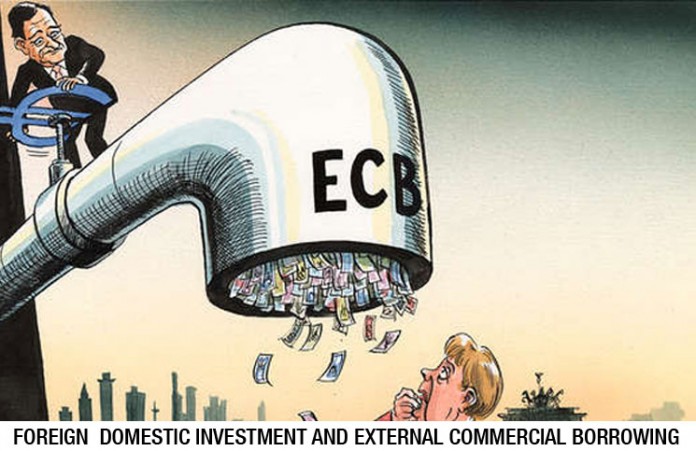In this blog post, Rituparn Uniyal, a fifth-year law student at Balaji Law College,Pune and pursuing a Diploma in Entrepreneurship Administration and Business Laws from NUJS, Kolkata, compares and contrasts between Foreign Direct Investment and External Commercial Borrowing.
Foreign Direct Investment (FDI)
FDI is an investment in the business by an investor from another country for which the foreign investor has control over the company purchased. The Organization for Economic Cooperation and Development (OECD) defines control as owning 10% or more of the business.
Further, as per RBI, if the investment is made in equity shares, fully and mandatorily convertible preference shares and fully and mandatorily convertible debentures then only the foreign investment would be FDI. Partly paid equity shares and warrants issued by an Indian shall also be treated as eligible FDI instruments, subject to compliance with the FDI scheme. There are also some sectors where FDI is prohibited through either of the routes.
FDI has become a major source of foreign investment in India in the last two decades due to various policy reforms and also the evolving business environment in the country. India is moving from having most businesses being family run towards more publicly held businesses today. FDI can be done by setting up a subsidiary company in India (as per the Companies Act, 2013) or joint venture with Indian/foreign companies in India.
There is two ways in which an FDI investment can be made in India, (i) government route, and (ii) automatic route;
- Government Route: In some sectors, the list of which is provided here(under the header ‘SECTORS REQUIRING CENTRAL GOVERNMENT APPROVAL’, last accessed on 6th July 2016), the foreign investor has to get prior approval from the Government. These applications are processed by Foreign Investment Promotion Board (FIPB). Application for the same can be made in Form FC-IL.
- Automatic Route: All the items not mentioned in the above route come under this. There is no requirement of prior approval of governmentfor FDI in activities/sectors under this route.
The company receiving the investment still has to report the FDI and issue of shares to the Reserve Bank of India, regardless of whether the FDI was made through the automatic route or the government route.
A company may also decide to open up a branch/liaison/project office.
- Liaison Office: can be opened to undertake liaison activities for the purpose of representing the company, promoting import/export, promoting collaborations on company’s behalf, cooperation in communication with Indian companies.

Prior approval from RBI required, which is usually granted for a period of three years. However, they are not allowed to earn income in India, and their role is limited to the collection of information on market opportunities and providing company and its products’ information to prospective clients in India.
- Branch Office: can be opened to conduct business in India after getting specific approval from RBI and certificate of establishing a place of business in India from Registrar of Companies. It can undertake activities like:
- Import & export of goods
- Rendering services
- Carrying out research work for the parent company
- Promoting collaborations on behalf of parent company
- Representing parent company in India and acting as buying/selling agent
- Providing IT services and developing software in India
- Providing technical support for products supplied
- Foreign airline / shipping company
However, there are certain restrictions on branch office, like:
- They are not allowed to engage in any retail trading activities in India.
- No manufacturing or processing activities can be carried out by them in India.
- Profits earned are freely remittable, after payment of taxes.
- Project Office: Usually a prior approval of RBI is required to set up a project office. It can be set up by a foreign company to execute a project in India awarded by an Indian company. It is just treated as an extension of the company as it is set up to carry out that specific work and therefore, is taxed at the rate applicable to foreign companies.
They are allowed to acquire property for their own use and carry out the works related to the project. They are also permitted to open non-interest bearing INR current accounts to carry out their operations.
External Commercial Borrowing
Any sum of money received from foreign sources or commercial loans obtained by Indian companies. It is one of the ways to bring funds into Indian entity or organisation. ECB can be made by way of commercial loans, buyer’s credit, supplier’s credit, FCCB’s and preference shares with a minimum average maturity of 3 years.
Suppliers Credit– Supplier’s credit is a credit facility a Buyer is able to avail from a Financial Institution in the seller’s country.[1]
Buyer’s Credit– A loan facility extended to an importer by a bank or financial institution to finance the purchase of capital goods or services and another big-ticket item.[2]
Foreign Currency Convertible Bond (FCCB’s)- Foreign currency convertible bonds are issued in currencies different from the issuing company’s domestic currency which is nothing but with mix features of equity and debt.[3]
Preference Share- Preference shares allow an investor to own a stake in the issuing company with the condition that whenever the company decides to pay dividends, the holders of the preference shares will be the first to be paid.[4]
ECB in India
ECB is regulated by Foreign Exchange Management Act along with the Foreign Exchange Management (Borrowing and Lending of Foreign Exchange) Regulations. These enactments give the power of regulating the ECB to Economic Affairs, Ministry of Finance, Government of India and the Reserve Bank of India. Further, Section 6(3)(d) of The Foreign Exchange Management Act, 1999 provides any borrowing or lending in foreign exchange in whatever form or by whatever name called .Also, clause (e) of the same section provides that any borrowing or lending in rupees in whatever form or by whatever name called between a person resident in India and a person resident outside India[5].
Who is eligible to take ECB?
ECB is assessed under two routes –
- Automatic Route
- Approval Route
ECB in real estate sector, industrial sector, especially infrastructure sector in India, are under Automatic Route, i.e. do not require RBI / Government approval. In the case of doubt as regards eligibility to access Automatic Route, applicants may take recourse to the Approval Route.
The revised Framework introduced three distinct tiers of eligibility criteria and related conditionalities for ECB (External Commercial Borrowings (ECB) Policy – Revised framework {c.f.: A.P. (DIR Series) Circular No.32 dated November 30, 2015}).
Eligible Borrowers- entities entitled to raise money through ECBs
- Manufacturing and development sector, i.e. in “real” or industrial sector
- SIDBI- Small Industries Development Bank of India;
- Units in Special Economic Zones (SEZs);
- Shipping and airlines companies;
- Export-Import Bank of India (Exim Bank) (only under the approval route)
- Non-Banking Financial Companies (NBFCs;
- Companies in infrastructure sector;
- Holding companies;
- Core Investment Companies (CICs);
- Real Estate Investment Trusts (REITs) and Infrastructure Investment Trusts (INVITs) coming under the regulatory framework of the Securities and Exchange Board of India (SEBI);
- NBFCs-Micro Finance Institutions (NBFCs-MFIs), Not for Profit companies registered under the Companies Act, 1956/2013, Societies, trusts and cooperatives (registered under the Societies Registration Act, 1860, Indian Trust Act, 1882 and State-level Cooperative Acts/Multi-level Cooperative Act/State-level mutually aided Cooperative Acts respectively), Non-Government Organisations (NGOs) which are engaged in microfinance activities1;
- Companies engaged in miscellaneous services viz. research and development (R&D), training (other than educational institutes), companies supporting infrastructure, companies providing logistics services;
- Developers of Special Economic Zones (SEZs) or National Manufacturing and Investment Zones (NMIZs);
Eligible lenders-
- International banks;
- International capital markets;
- Multilateral financial institutions (such as IFC, ADB, CDC, etc.);
- Export credit agencies;
- Suppliers’ of equipment;
- Foreign collaborators and
- Foreign equity holders (other than erstwhile OCBs).
ECB limits- Under automatic route for –
- Infrastructure sector , real –industrial sector up to USD 750 million
- Software development sector, hotels, hospitals –up to USD 200 million
- Microfinance activities – up to USD 100 million
- A company or other remaining entities (other than a financial intermediary, registered under the Companies Act, can raise up to USD 500 million in a financial year.
If the above-mentioned limits are exceeded then, the approval route has to be taken.
Generally, companies can borrow under the automatic route. Approval needs to be taken under the following cases:
- When a service sector company which is not in hotels, hospital or software services example R&D, Training institutions, etc.;
- SEZ developers (wanting to provide infrastructure facilities in the SEZs) Co-operative societies, financial institutions or banks;
ECB which are not covered under the automatic route are subject to approval by the RBI and depends on case to case basis.
Process to avail ECB
Under the automatic route, borrowers have to submit Form 83 to the designated AD cat 1 bank to obtain a Loan Registration Number (LRN). The AD forwards form 83 to RBI Department; loan can only be availed after LRN is issued.
Under the approval route, the borrower has to submit an application in Form ECB to RBI. After examination of the application, permission may be granted.
Conclusion
ECB means foreign funding which is not in the form of equity. When it is used in the form of equity capital, then it is called Foreign Direct Investment (FDI). Any Investment made towards core capital of an organisation such as equity shares, convertible preference shares or convertible debentures. We should note here that those instruments which can be converted into equity are called convertible. The convertible instruments are covered under the FDI Policy. Any other direct capital is not allowed in ECB.
References:
[1] https://expertmile.com/arti.php?article_id=956
[2] ibid
[3] ibid
[4] http://economictimes.indiatimes.com/definition/preference-shares
[5] Section 6(3)(e) of FEMA Act, 1999
 Serato DJ Crack 2025Serato DJ PRO Crack
Serato DJ Crack 2025Serato DJ PRO Crack










 Allow notifications
Allow notifications


